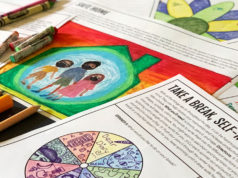Women are known to be workaholics. And not just in our careers.
Often, we’re busybodies, working overtime to fill every other shoe we can fit our foot into — friend, wife, mom, volunteer.
We have a lot of heart, but it’s the very thing some of us forget to take care of, making way for heart disease.
It’s the No. 1 killer of women over 20, and it’s largely preventable if we just take time to be responsible for our health.
This month, we recognize American Heart Month (americanheart.org) and encourage women to be more aware — or
She grew up playing basketball and swimming, but once she got out of school and into the working world, she got tired of it.
“I quit working out,” she says. “I got too busy.
Whether it was partying or building my career, I just didn’t think
about it. I had to go to work, I had somewhere to be. There was always
something more important than working out. It just didn’t interest me
anymore.”
Her diet wasn’t a priority either. She says if it smelled good, she put it in her mouth.
But all that changed about 15 years ago. In the
mid-’90s, diabetes was running rampant in her family. Her father had
it, and it led to a fight with congestive heart failure. It was a
wake-up call. She didn’t want diabetes, heart disease or any health
problems.
Neither did her mother. Before anyone else she knew, her mom started exercising and eating well.
“When your mom does something, you take notice. She became aware and conscious. She was the one who got me started.”
So Patrice started reading food labels. She carved time out of her busy schedule to work out. It started with a walk.
“I went for a walk and I wasn’t moving fast enough,
so I started running. It was painful and I thought if something hurt me
this bad I want to master it.”
She started running regularly and joined a runner’s group. Eventually she started taking up marathons. Her workouts expanded.
Now, the 40 -something fitness junkie does
two-a-days that include kickboxing and boot camps twice a week. She
also runs, bikes and takes zumba and body sculpting classes. Through it
all, she keeps track of her heart rate. It rests at a healthy 50 beats
a minute—a level she says she worked hard for.
Patrice says women have to be in tune with their
health. We can’t count on simple solutions when we could prevent the
problems all together.
“As an African-American woman, I’m going to say African-American women and all women look for a quick fix in a magic bullet.
“If we can take a pill for it, then we’re fine. I
think we are too complacent when it comes to our health. I don’t
understand why we would want to be welded to pills. I have better
things to spend my money on.”
She says women opt for easy outs because they don’t
find the time to take care of themselves. But if you don’t take care of
yourself, you’re no good to anyone else.
As a board member of Women’s
it’s her mission to empower girls and women through advocating sports
and fitness. She says support is important if we’re going to become
healthier.
“It’s important to encourage one another,” she says.
“I run with an incredible group of friends. You feel accountable to
each other.”
—
(c) 2010, The Kansas City Star.
Visit The Star Web edition on the World Wide Web at http://www.kansascity.com.
Distributed by McClatchy-Tribune Information Services.














